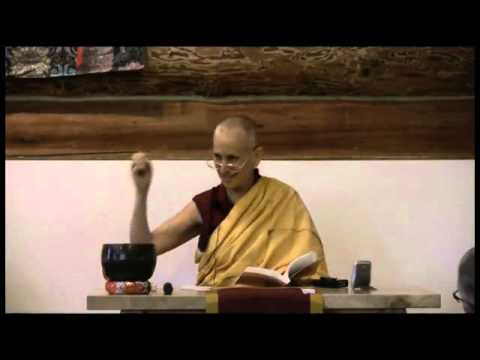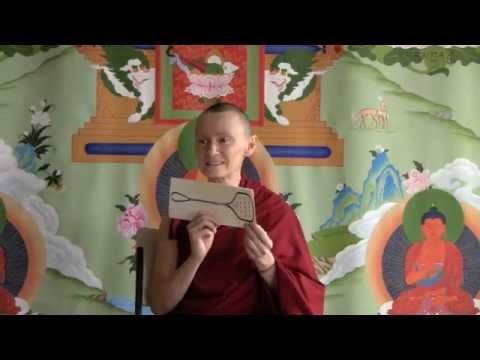The four opponent powers in daily life
Part of a series of teachings given at the Winter Retreat from December 2011 to March 2012 at Sravasti Abbey.
- The importance of doing purification practice
- Interrupting our afflictions to apply the four opponent powers
Vajrasattva 19: Using the four opponent powers in daily life (download)
If I really think about the law of cause and effect: what I was involved in when I created a negative action, the choices I made, who I was with, all the circumstances. If I really look at that, and then if I think about the results of those choices—the suffering that it caused myself and caused others. Then also if I think about this mental continuum, this consciousness that is not physical, that is residing in this body in this life. It has been around since beginningless time, taking rebirth after rebirth after rebirth, creating negative actions. Then doing purification practice is really important, really important—if I can keep my mind thinking in that way.
If we think of the example that Atisha gave us by purifying a negative action as soon as possible after we commit it, then we can adopt this habit also.
I thought today we’d just go through an example of applying the four opponent powers after doing a negative action when we are not in meditation as another method to use. Let’s say that I’m in a conversation with somebody. It’s going fine, and then they say something about me, to me, and I have this huge reaction. I feel my anger rising and I respond to the statement with angry, harsh words. The person reacts to my words, responding back with angry, harsh words. I take those words in, and respond back with angry, harsh words. This is how anger goes. I don’t know if anyone else has experienced this?
After that exchange, even if it’s not so blatant but more subtle, then I walk off in a huff. I’m walking, and as I’m walking my mind is replaying the scene over and over again, over and over again. I notice as I’m doing this that my anger is rising. It’s getting even more intense. Then I have the thought that, “I’m miserable. I’m miserable.” When I have that thought, then I think about and remember that my anger steals my happiness. It really causes me to lose my deepest wish, which is to have happiness, which is to be of benefit. Anger in that moment really causes so much misery.
When I have that anger the merit that I have been trying to accumulate by doing positive or virtuous actions gets destroyed. When I have that thought, that gets me out of the story of blaming the other person for what they said. But then what it does often is I turn on myself. I start beating myself up because I got angry. That’s even more miserable. I’ve been down that road enough that I know it’s just a dead end, doesn’t go anywhere but misery—so I want to put that down.
The power of reliance
Then what comes to mind is to purify and do the four opponent powers. So I go and find some place to sit down. First of all I visualize the Buddha in front of me. Then I say to myself the refuge and bodhicitta prayer. I do that silently inside. When I do that then I’m starting to really turn my mind away from the anger. I’m starting to repair. I’m starting to get myself out of anger and get myself toward where I really want to be—which is to try to be of benefit to people, try to be kind to people. That’s the first power of reliance.
The power of regret
Then I want to move into the second power which is regret. With this one I think of the suffering that this experience just caused me and the harm that it just caused the other person. It’s very fresh. You can really feel that, of course, in the moment. With that one I’m starting to do the opposite action of stopping blaming the other person. I’m starting to acknowledge my mistake openly to myself, be honest with myself, not deny what happened, and really getting clear about what I just did.
The power of the remedial action
Then I think about the third action, which is the remedial action. Let’s say later that day, I’m going to be helping adults study and prepare for taking the G.E.D. test so that they can get the high school equivalency diploma. That can be a very excellent remedial action. When I’m involved in the class, I want to keep a little part of my mind focused on the regret that I feel for being angry earlier in the day, and the pain that caused me and others. I also want to keep my heart open to the feeling of doing a virtuous action by helping somebody, by helping others. I want to keep both of those in my mind.
The power of determination
Then for the power of the determination, if this is a habitual pattern and I can’t say that I’m never going to get angry again (which I can’t say), then I think about what I can modify. What could I transform in the future? I might say, “Well, the next time I feel the anger, I’m going to make this determination not to speak harsh words. And I’m going to remove myself from the situation as soon as I can—just as soon as I can.” So that’s what the plan is, that’s what I’m determining to do. Again, whatever we determine to do—that is opposite of having no wish to stop repeating the mistake. Also it indicates that I believe that this pattern of anger can be transformed; that it is impermanent. I think that is a really important piece.
After I make the determination, then I dedicate the merit that I have just created from going through this whole process. As we go through these four opponent powers and do this with these actions that we create throughout the day, we get really habituated to using them. Then it’ll arise even when our mind is quite shaken with big anger or big attachment or whatever it is. We can quite quickly go through this and apply it. It’s very beneficial for our minds.
Venerable Thubten Jigme
Venerable Jigme met Venerable Chodron in 1998 at Cloud Mountain Retreat Center. She took refuge in 1999 and attended Dharma Friendship Foundation in Seattle. She moved to the Abbey in 2008 and took sramanerika and sikasamana vows with Venerable Chodron as her preceptor in March 2009. She received bhikshuni ordination at Fo Guang Shan in Taiwan in 2011. Before moving to Sravasti Abbey, Venerable Jigme (then Dianne Pratt) worked as a Psychiatric Nurse Practitioner in private practice in Seattle. In her career as a nurse, she worked in hospitals, clinics and educational settings. At the Abbey, Ven. Jigme is the Guest Master, manages the prison outreach program and oversees the video program.


